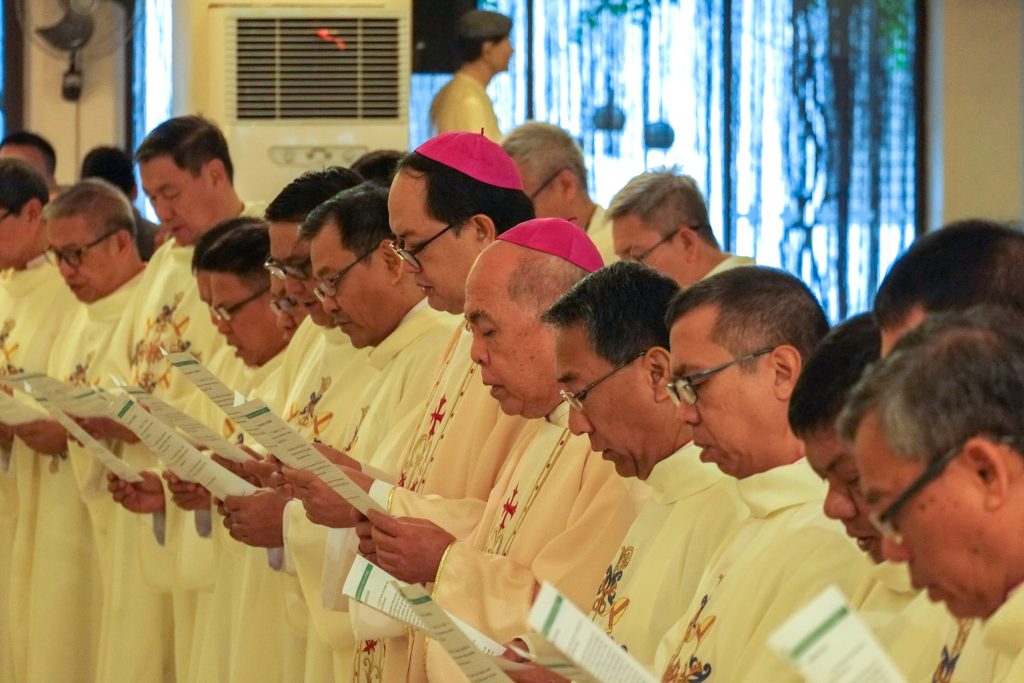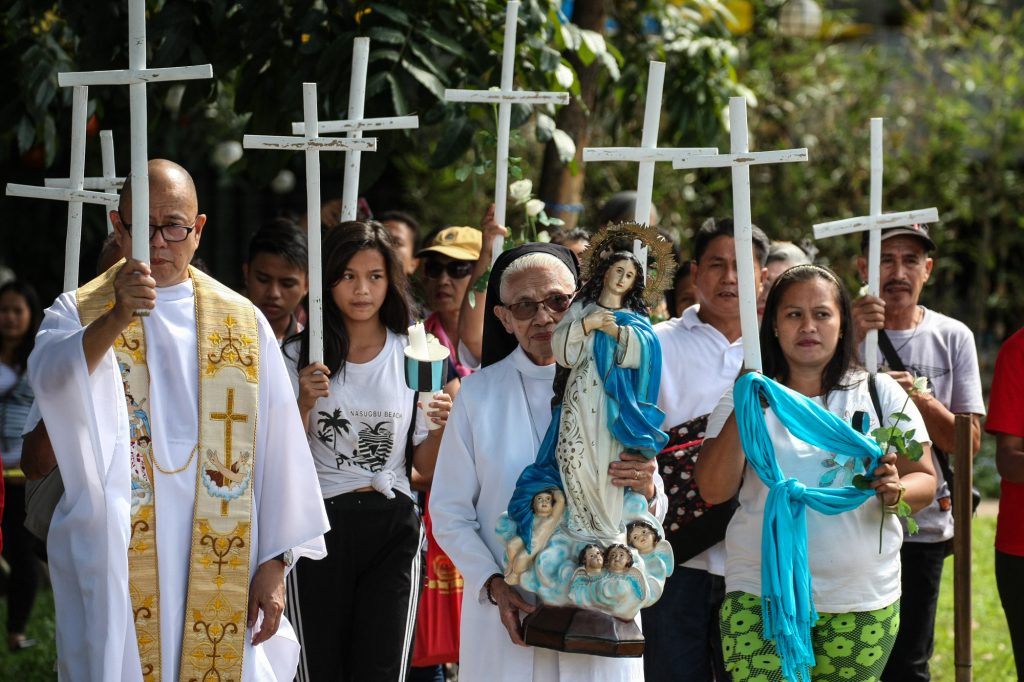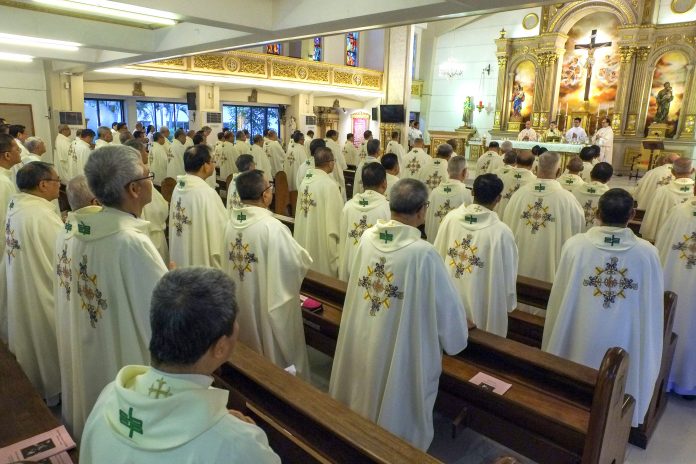Catholic Church leaders in the Philippines zigged and zagged and dodged President Rodrigo Duterte’s thunderbolts for four years as he steadily veered towards autocratic rule.
Now the Catholic Bishops’ Conference of the Philippines (CBCP) may have found their lines on the sand: the new anti-terror law and the series of attacks against local journalists and news organizations.
The bishops’ July 19 statement is unusual for its strong language and unequivocal positions. It is even more impressive in the face of a strong lobby by the National Task Force to End Local Communist Armed Conflict.
“While a semblance of democracy is still in place and our democratic institutions somehow continue to function, we are already like the proverbial frog swimming in a pot of slowly boiling water,” read the bishops’ statement signed by Bishop Pablo Virgilio David of Kalookan, acting president of the bishops’ conference.
It accuses the government of a “pattern of intimidation” that threatens free expression.
The first citations clearly rebuff the government’s “Enemy of the State” presentation.
The CBCP backed “people active in social advocacies who are accused of being communists” and “bishops, priests and religious who were included among those falsely charged by the Philippine National Police with crimes of sedition and inciting to sedition.”
China’s shadow
The bishops’ statement responds to the call of Myanmar’s Cardinal Charles Maung Bo for prayers for Hong Kong, following the signing of its own National Security Act.
It likens the Philippine experience to that of China’s special territory, where activists have had to re-strategize protests because of the broad sweep of potential charges they face.
“Will religious leaders now be criminalized for preaching about human dignity, human rights, justice, liberty, truth? We have learned from heavy experience that wherever freedom as a whole is undermined, freedom of religion or belief — sooner or later — is affected,” Cardinal Bo warned.
China’s message to Hong Kong protesters and Duterte’s towards his people hew to the same line: only those who endanger national security should fear the mailed fist.
Hardly a confidence-raising statement given both leaderships’ track record: the Tiananmen massacre and Beijing’s response to Hong Kong protests, and more than 20,000 poor drug suspects and 200 activists slain under Duterte.

Long, winding road
You would think rising murders would have been enough to galvanize Catholic bishops even in the first year of Duterte’s rule.
“Thou shalt not kill” is part of the Ten Commandments. “Kill” is Duterte’s favorite order.
They, the bishops, took their sweet time.
They spoke up, of course, when Duterte cursed Pope Francis, or when he uttered blasphemous remarks and hurled unfounded accusations against clergy.
But except for a few outspoken priests — and a bigger number of feisty nuns — senior clergy played blind and deaf and dumb to the atrocities, some taking place not too far from their refectories and diocesan offices.
If they spoke at all, their messages were muted, their language tentative, ambivalent, prone to euphemisms.
Even Cardinal Luis Antonio Tagle, the highest Filipino official in the Vatican, a savvy communicator, fell back on the soap opera allure of sorrow and pity, failing to embrace Pope Francis’ clear prophetic stand on justice.
Some clergy say Church leaders needed to be circumspect as they tried to find the right temper for engagement with Duterte.
But there are few things as black and white as a pogrom, a hunt without due process, fueled by a desire to get rid of certain categories of people.
Duterte, in fact, made it very clear that he did not consider his targets human beings.
How clerics who rain fire and brimstone on the LGBTQ community, or women who insist on having control over their reproductive rights, could walk around a massacre of their flock is a big theological puzzle.
But there also have been prophets, lights of hope.
Bishop David, who administers a diocese with one of the highest casualty rates in Duterte’s drug war, has taken over the tasks of CBCP head Archbishop Romullo Valles of Davao who suffered a mild stroke.
Bishop Broderick Pabillo, apostolic administrator of the Archdiocese of Manila, Bishop Gregorio Alminaza of San Carlos, and about a few dozen clergy across the country succored besieged urban poor and rural communities as Duterte raged against rights advocates who were accused by the military of consorting with terrorists.

Resistance
Despite its majority, the Catholic Church in the Philippines has never been a homogenous entity.
In the Spanish colonial centuries, it was a pillar of injustice, with foreign friars persecuting men and women fighting for independence.
In the Marcos martial law decades, a substantial number of the religious fought in the underground resistance while others danced with the dictator.
The institutional Church may lead on matters of faith, but it has always lagged behind its flock in defense of rights and the fight for justice.
Even Pope Francis’ life shows that arc. He, at least, learned to walk in the footsteps of Jesus.
Many others cocooned in the pomp and wealth of a mighty fortress see growth as twinned with the interests of benefactors and patrons.
Those to sally forth know better.
Vincentian priest Danilo Pilario was a seminarian when he joined protests against Marcos.
He has seen up close and personal the anguish of families targeted by Duterte’s drug war in Payatas, a sprawling urban poor community in the shadow of a mountain of trash.
The priest spent the pandemic lockdown months peering inside culverts, under bridges, in alleys lacking electricity, to find and feed society’s unseen and uncounted.
“It is time to stand up, to rise and make our voices be heard,” he told his fellow religious.
“In the face of evil, silence is yes to the status quo. Neutrality is to be complicit with the powers that be,” he said.
The risks of speaking out may be high. Duterte always makes good on his threats. But retreat will exact a higher price for the Catholic Church in the Philippines.
A Church that cannot march with its flock as they fight for justice will lose the fight for souls.
Inday Espina-Varona is an award-winning journalist in the Philippines. She is a recipient of the “Prize for Independence” of the Reporters Without Borders in 2018.
The views expressed in this article are the opinions of the author and do not necessarily reflect the editorial stance of LiCAS.news.









